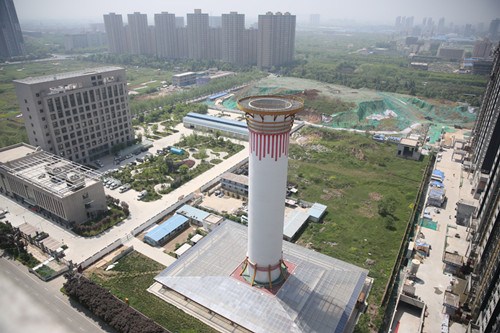
An air purifying tower that uses solar power stands in Xi'an, Shaanxi province, on Tuesday. (DENG XIAOWEI/FOR CHINA DAILY)
Efforts in the Beijing-Tianjin-Hebei region are paying off, ministry says
A government action plan addressing air pollution in the Beijing-Tianjin-Hebei region has achieved better-than-expected results, the country's top environmental authority said on Thursday.
The plan, jointly launched last year by the Ministry of Ecology and Environment and nine other ministries, aimed to cut the density of particulate matter and days with heavy air pollution in 28 cities by at least 15 percent from October to March.
Over the past six months, the average concentration of PM 2.5 in the region fell by 25 percent year-on-year to 78 micrograms per cubic meter, said Liu Youbin, spokesman for the Ministry of Ecology and Environment.
The number of days with heavy air pollution in the region was cut in half, Liu said.
"Officials in Beijing and surrounding areas have been taking a series of measures-including reducing the use of bulk coal and heavy trucks and dealing with polluting enterprises-to control air pollution, and the measures have achieved positive results," he said.
The governments of the 28 cities closed or upgraded about 62,000 small, poorly managed polluting enterprises, which greatly contributed to the decreased concentration of PM 2.5, Liu said.
The governments are firmly committed to promoting the ongoing shift from coal to clean energy as heating sources, such as natural gas and electricity, he said. Nearly 4 million households in the Beijing-Tianjin-Hebei region have switched, reducing bulk coal use by 10 million tons. Also, 56,000 small, inefficient coal-fired boilers have been shut down, he said.
Liu also said transportation in the region has been greatly improved by gradually shifting from roads to railways. Ports on the Bohai Sea saw a nearly 20 percent increase in the transport of coal by rail, and a diminished reliance on heavily polluting trucks.
Off-peak production and transportation will be encouraged in heavy industries such as iron and steel, coking, aluminum and chemicals, Liu added.
The region was hit by moderate to heavy air pollution in recent days due to unfavorable meteorological conditions that prevented dispersal of pollutants, he said.
"The efforts we made have sometimes been offset by unfavorable weather, and it will take time for us to win the longer war," he added.


















































